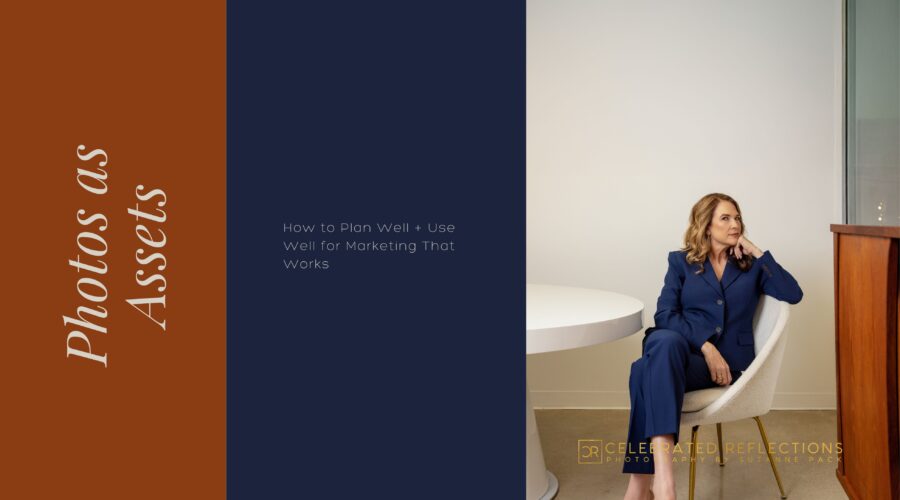
Most business owners invest in photos and then… let them live in a gallery.
That’s like buying beautiful furniture and leaving it in storage.
Your images should work for you — supporting your marketing, driving trust, and making you unforgettable.
Photos become assets when they have a job to do.
This guide will help you plan well and use well so your photos continue to move your business forward — long after the session ends.
Whether you outsource or DIY your marketing, you are the one who knows your brand best. That makes you the creative director — even if you never planned to be.
Many small-business owners hire task-based support:
A web designer who “just puts images where you tell them”
A social media manager who posts but doesn’t shape the story
A photographer who captures images but doesn’t guide the marketing purpose
If you don’t communicate your brand clearly, the result is inconsistency — and confusion repels clients.
Your role is ensuring your brand looks and feels aligned everywhere:
Website and social media
Emails and newsletters
Speaker and promotional assets
Digital and printed marketing
A cohesive visual brand shows your audience exactly who you are, what you do, and why it matters — and it attracts the clients who are already looking for someone exactly like you.
Great marketing photography starts long before the camera comes out.
Ask:
What am I promoting in the next 3–6 months?
Who am I targeting?
Where will new clients first interact with me?
Photos become assets when they’re designed to support your marketing — not just to look pretty.
Plan for both immediate and future use:
Website hero banners and About page storytelling
Launch campaigns for new services or events
Social media posts, reels, and ads
Speaker sheets and podcast profiles
Email nurture sequences and newsletters
Press, awards, and media submissions
Your gallery should include:
Hero images with room for headlines
Close-ups for approachability
Action shots that show the work you do
Lifestyle moments that create connection
Behind-the-scenes or detail shots
A range of expressions (looking at camera + looking away) to tell multiple stories
Plan for:
Wardrobe and environments that complement your brand palette
Backgrounds that support easy cropping
Negative space for messaging
Compositions that reinforce your identity
 5. Create a Shared Vision Board
5. Create a Shared Vision BoardGather ideas into one place such as Pinterest or Canva:
Brand colors and textures
Typography and font styles
Words that define your tone
Layout and graphic inspiration
Visual storytelling styles
Share this with your photographer, designer, and social media support to ensure consistency across platforms.
When your tone, typography, and imagery speak the same language, your brand becomes instantly recognizable.
With a clear plan in place, your photos are now ready to go to work.
Your gallery is not the end of the process — it’s the beginning of putting your photos into action.
Here’s the lifecycle of strategic brand photography:
Brand clarity and marketing strategy
A session that aligns with that strategy
A gallery of purposeful visual assets
Marketing execution where ROI is realized
Your photos have one job: support your business in the world.
You are not just receiving images — you are unlocking a brand toolkit designed to build trust, visibility, and demand.
Photos should appear consistently and frequently:
Website pages and calls-to-action
LinkedIn and professional profiles
Social media posts, stories, and ads
Articles, blogs, downloadable resources
Podcast, speaker, or media opportunities
Recognition builds trust. Repetition builds recognition.
Choose one day a month to:
Write 4–8 content pieces
Design graphics using your brand images
Pair visuals with clear calls-to-action
Schedule ahead so your marketing runs while you work
Call it whatever fits your style:
Marketing Prep Day, Visibility Day, Content Day, Brand Activation Day…
If writing or design isn’t your strength:
Collaborate. Meet with 2–3 business friends and trade skills so everyone leaves with scheduled content.

Increase ROI by repurposing each photo:
Website banner
Profile photo
Carousel post
Reels cover
Quote background
Circle crop for podcast usage
Black and white version
Cropped close up
Wide crop with text overlay
The more ways you use one photo, the more valuable your investment becomes.

When cropping or designing:
Position your eyes or focal point along a grid line
Keep text in the negative space
Avoid crowding the frame
Photography rules still apply — even in Canva.
Use this checklist to put your gallery into motion:
Update profile photos across all platforms
(Instagram, Facebook, LinkedIn, Google Business Profile, Zoom, email avatar, scheduling tools)
Update your website About and Home pages
Create and schedule 4–8 social posts
Refresh LinkedIn banner and email signature
Develop quote and testimonial templates
Reintroduce yourself to your audience
When photos are used intentionally and often, they pay for themselves repeatedly.
One of the most common questions I’m asked is:
“How often should I do new branding photos?”
There’s no one-size-fits-all answer — because your photography needs change as your business evolves.
Consider refreshing when:
Your appearance or style has noticeably changed
You’re launching something new or big
You’re rebranding your visuals or website
You want fresher content for social media
Helpful rhythms:
Quarterly if your marketing is fast-moving
Annually for most service-based businesses
Every 18–24 months if you’re quieter online
Mini-updates as needed to support campaigns
A session should focus on the images you’ll need for the next chapter — the next 3, 6, 9, or 12 months of your marketing — not forever.
Updating a few times a year doesn’t have to mean a full-day shoot.
Short updates or subscription-style content days can fill in the gaps.
New photos aren’t a luxury — they’re a reflection of the momentum in your business.
You don’t need a degree in design —
you need clarity, consistency, and the confidence to lead your brand’s visual direction.
When your photography, messaging, and marketing align, your audience recognizes you and trusts you — before you ever meet.
At Celebrated Reflections, every branding session begins with strategic creative direction:
Purpose-driven planning consultation
Brand-aligned wardrobe guidance
A gallery designed to support your marketing
Because beautiful photos should also be profitable photos.
Book a discovery call
Let’s design photos that work as hard as you do.